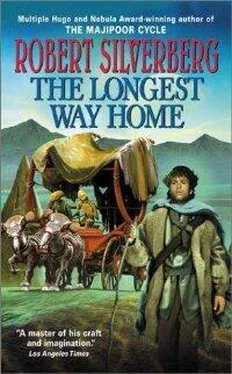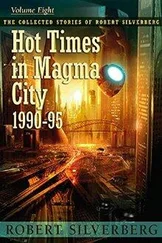Finally the job of fashioning the snare appeared to be done. Joseph stepped back, admiring his handiwork. Any animal that ran into it with sufficient velocity would find itself caught, he hoped. Those lively little tawny-skinned animals that went frisking swiftly around the place in groups of five or six: they were just reckless enough, possibly, to be taken that way.
But they were not. Joseph hid himself behind a big three-sided boulder and waited, an hour, two hours. It was getting on toward twilight now. In this early dusk his snare would surely be invisible: he could barely see it himself, looking straight toward the place where he knew it to be. From his vantage-point behind the boulder he caught a glimpse of his furry striped friend browsing around nearby, scratching up large rounded seeds out of the ground and munching on them in a noisy crunching way. But he doubted that that would bother the little tawny animals. And at last they came frolicking along, a good-sized herd of them, a dozen or more this time, tails held stiffly erect, ears pricked up, nostrils flaring, small hooves clacking as they skipped over the rocky soil. They were moving on a path that seemed likely to take them straight toward Joseph’s trap. And indeed it was so. One by one they danced right up to it, and one by one as they reached it they launched themselves into the air in elegant little leaps, soaring prettily over the outstretched cord with two or three feet to spare and continuing on beyond, switching their tails mockingly at him as they ran. They went over his snare like athletes leaping hurdles. Scarcely believing it, Joseph watched the entire troop pass by and prance out of sight.
He waited half an hour more, hoping some less perceptive animal might come by and fall victim to the snare, one of the many wandering beasts of these unpromising fields. That did not happen. Darkness was coming on and he had nothing whatever to eat. In the morning things would be no better. He was looking at starvation again, much too soon. None of the parched, gnarly plants that grew in this dry land looked edible to him, though the grazing animals plainly did not mind them. He could not bring himself to eat the three-sided saw-edged blades of tough red grass that grew in sparse clumps everywhere around. There were no likely roots or tubers, no snails, perhaps not even ants. Somewhere beyond those white-edged hills there might be a land of tender fruits and sweet, succulent, slow-moving land crabs, but he might not live long enough to reach it, if indeed any such place existed. Nor could he hope that Folkish rescuers would come conveniently to his rescue a second time when he collapsed once again by the wayside in the last stages of hallucinatory exhaustion.
I must find something that I can kill and eat, Joseph thought, and find it quickly.
There was a familiar snuffling sound off to his left.
No, Joseph thought, aghast. I can’t! And then, immediately afterward: Yes! I must!
His new friend, his self-appointed companion. This slow-moving musky-smelling seed-eating thing, so trusting, so unthreatening. It was not just any animal; somehow this day it had turned into an animal that he felt he knew. That is sheer imbecility, he told himself. An animal is an animal, nothing more. And he was in dire need. But could he kill it, this harmless, friendly creature? He must. There was nothing else. Nothing. Nothing. Nothing. It was a horrifying idea, but so too was starving. He had experienced starvation once already, and once was more than enough: the steady melting away of his flesh, the shriveling of his muscles, the weakening of his bones, the blurring of his vision, the swollen tongue, the taste of copper in his throat, the quivering legs, the headaches, the giddiness, the craziness.
He picked up a wedge-shaped rock, a large one, the biggest one that he could hold. The animal was looking at him in a vague incurious way. Clearly it did not have the slightest awareness of Joseph’s intentions. Joseph prayed that there was little or no intelligence behind those dull eyes. Did you ever really know how intelligent any creature might be? No. You never did, did you? He thought of the poriphars who had shared their food with him beside that stream in the lovely springtime country just below the mountains. No one doubted that they were intelligent beings. Stand this creature on its hind legs and it would look a little like a poriphar, Joseph thought: a distant cousin, possibly. He hoped it was only a coincidental resemblance. “Forgive me,” he said foolishly, taking a deep breath, and raised the rock in both hands and brought it down as hard as he could across the striped animal’s wide flat forehead.
The impact barely seemed to register on it. It stared stupidly at Joseph and took a couple of wobbly uncertain steps backward, but did not undertake any real retreat. Joseph hit it again, and again. And again. He went on and on, to little apparent avail. The animal, staggering now, made a sorrowful rumbling noise. I must be unrelenting, Joseph told himself, I must be ruthless, it is too late to stop. I must carry this through to the end. He struck it once more and this time the thing fell, toppling heavily, landing on its side and moving its feet through the air in a slow circular path. The rumbling continued. There was a breathy whimper now, too. The reddish-green eyes remained open, peering at him, so Joseph thought, with a reproachful stare.
He felt sick. It was one thing to hunt like a gentleman, with a weapon that spat death cleanly and quickly from a distance. It was another thing entirely to kill like a savage, pounding away brutishly with a rock.
He went to his utility case and found his little knife, and knelt, straddling the creature, feeling strong spasms of some sort going through its back and shoulders, and, weeping now, drove the blade into the animal’s throat with all his strength. The rear legs began to thrash. But the knife was barely adequate to the task and it all took very much longer than Joseph expected. I must be unrelenting, Joseph told himself a second time, and clung to the animal, holding it down until the thrashing began to diminish.
He rose, then, bloodied, sobbing.
Gradually he grew calm. The worst part of it is over, he thought. But he was wrong even about that, because there was still the butchering to do, the peeling back of the thick pelt with the knife that was scarcely more than a toy, the slitting of the belly, the lifting out of the glistening abdominal organs, red and pink and blue. You had to get the internal organs out, Anceph had taught him long ago, because they decayed very quickly and would spoil the meat. But it was a frightful task. He was shaken by the sight of the animal’s inwardness, all that moist shining internal machinery that had made it a living, metabolizing thing until he had picked up his rock and begun the ending of its life. Now those secret things were laid bare. They all came spilling forth, organs he could not begin to identify, the sacred privateness of the creature he had killed. Joseph gagged and retched and turned away, covered with sweat, and then turned back and continued with what he had to do. Twice more he had to pause to retch and heave as he went about the work, and the second time the nausea was so intense that it was necessary for him to halt for some five or ten minutes, shaking, sweating, dizzied. Then he forced himself to continue. He had arrogated unto himself the right to take this innocent creature’s life; he must make certain now that the killing had not been without purpose.
When he was done he was slathered with gore, and there was no stream nearby in which he could bathe himself. Unwilling to squander his small supply of drinking-water, Joseph rubbed himself with gritty handfuls of the sandy soil until his hands and arms seemed sufficiently clean. Then he searched in his utility case for his firestarter, which he had not used in such a long time that he was not at all sure it still worked. The thought that it might be necessary for him to eat the meat raw brought Joseph to the edge of nausea again. But the firestarter worked; he built a little bonfire of twigs and dried leaves, and skewered a steak and roasted it until the juices dripped from it; and then, the culminating monstrous act, he took his first bite. The meat had something of the same sharp and musky taste that he had smelled in the animal’s pelt, and swallowing it involved him in a mighty struggle. But he had to eat. He had to eat this . And he did. He ate slowly, sadly, chewing mechanically, until he had had his fill.
Читать дальше












